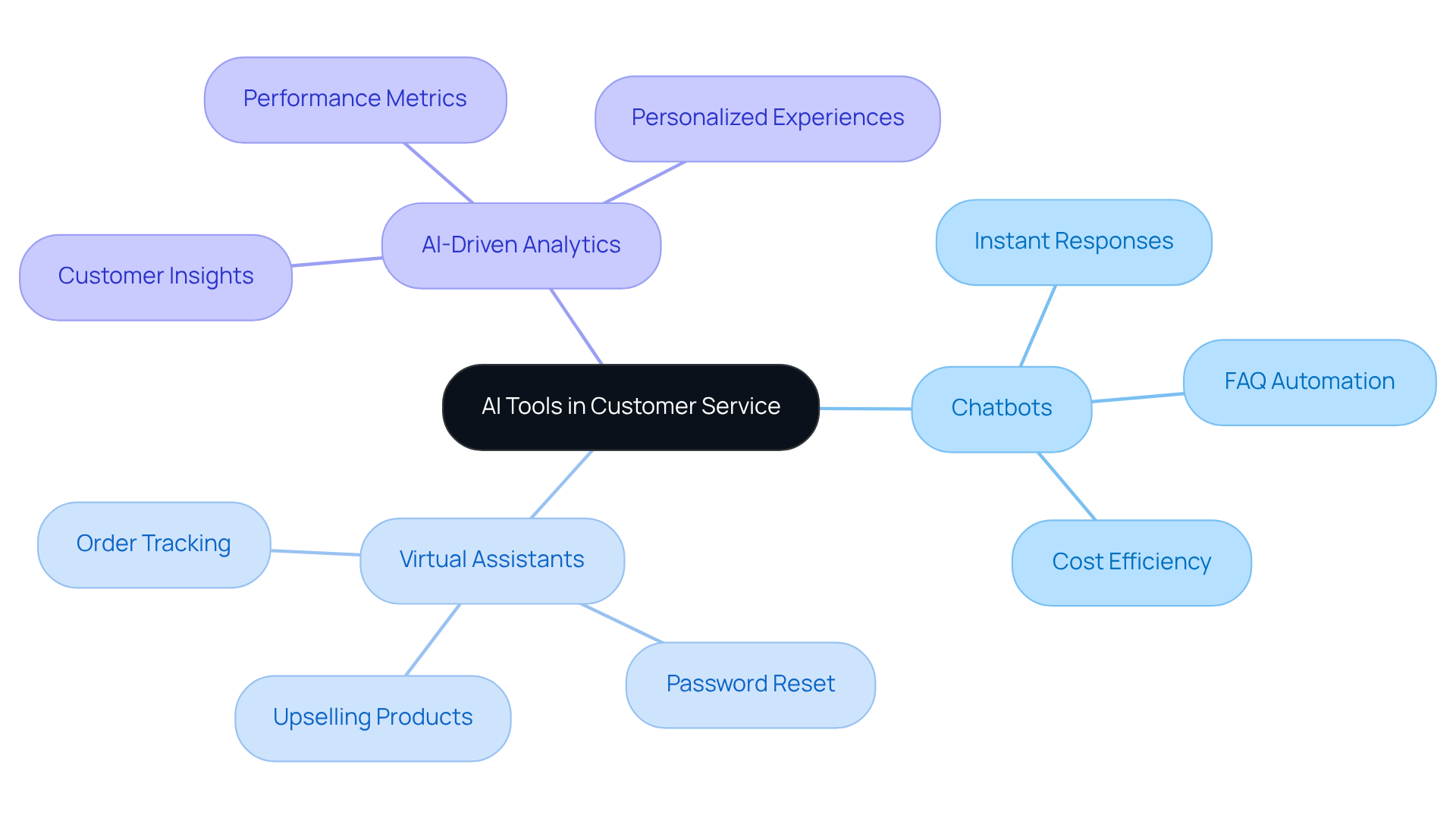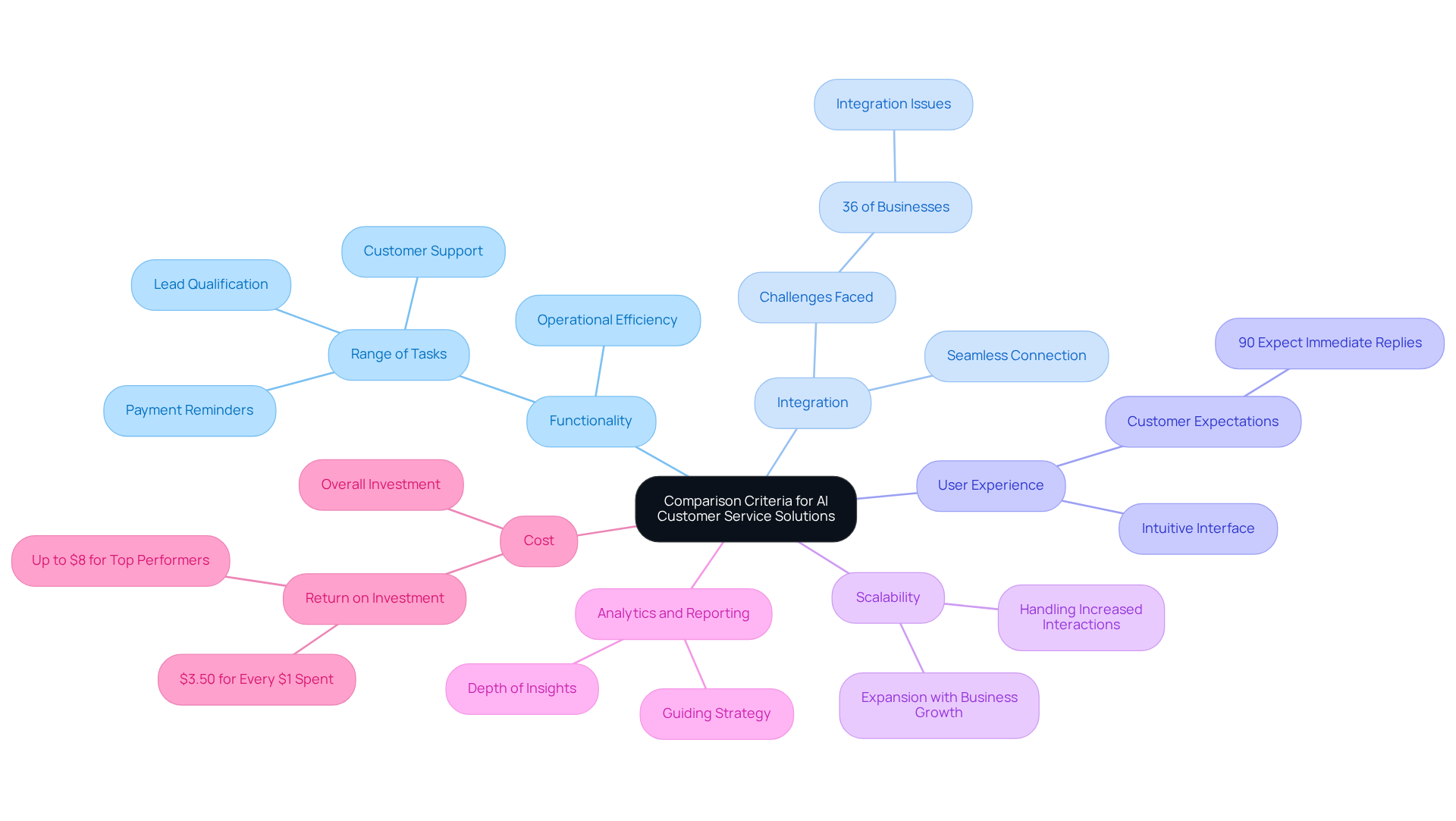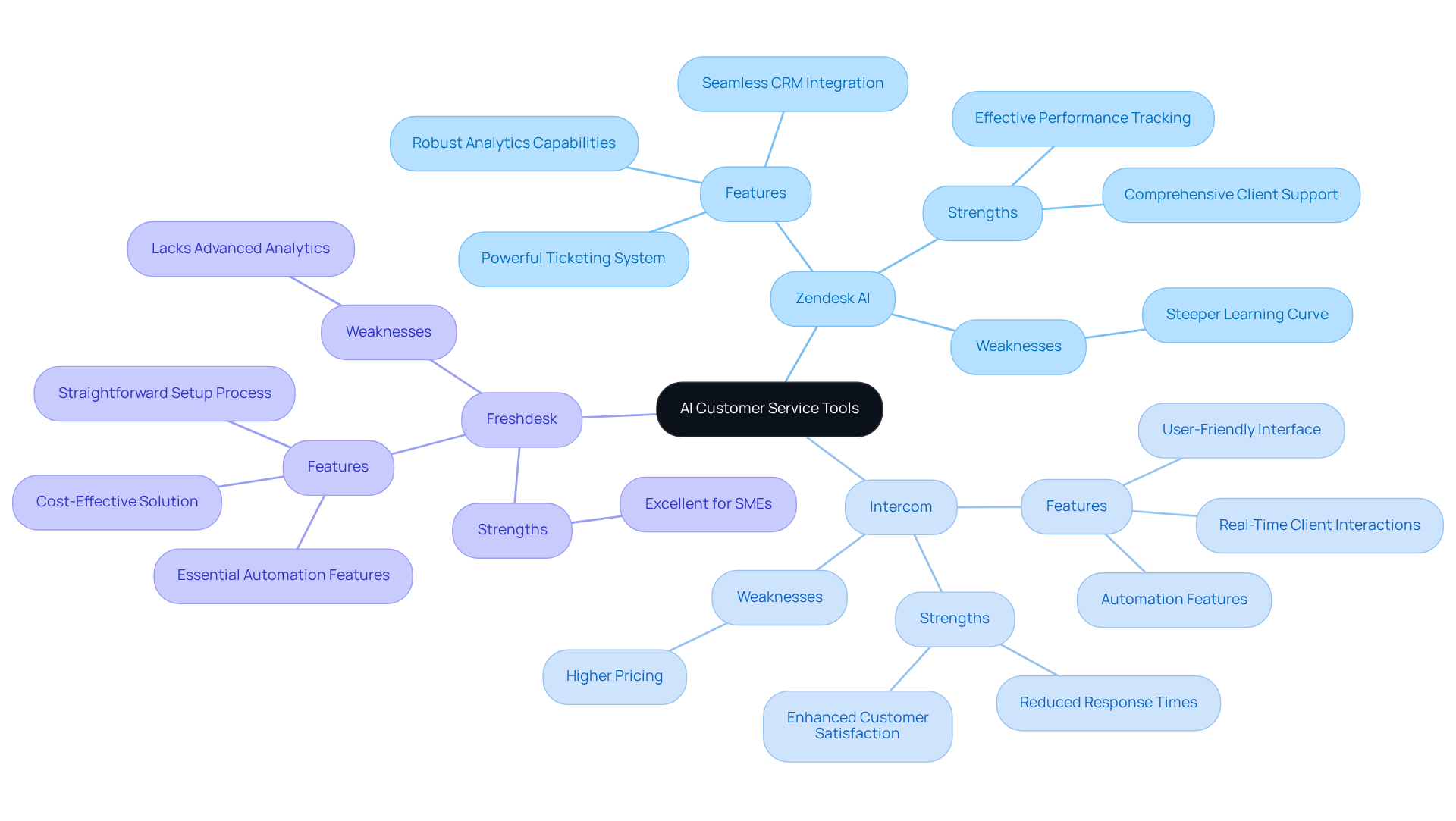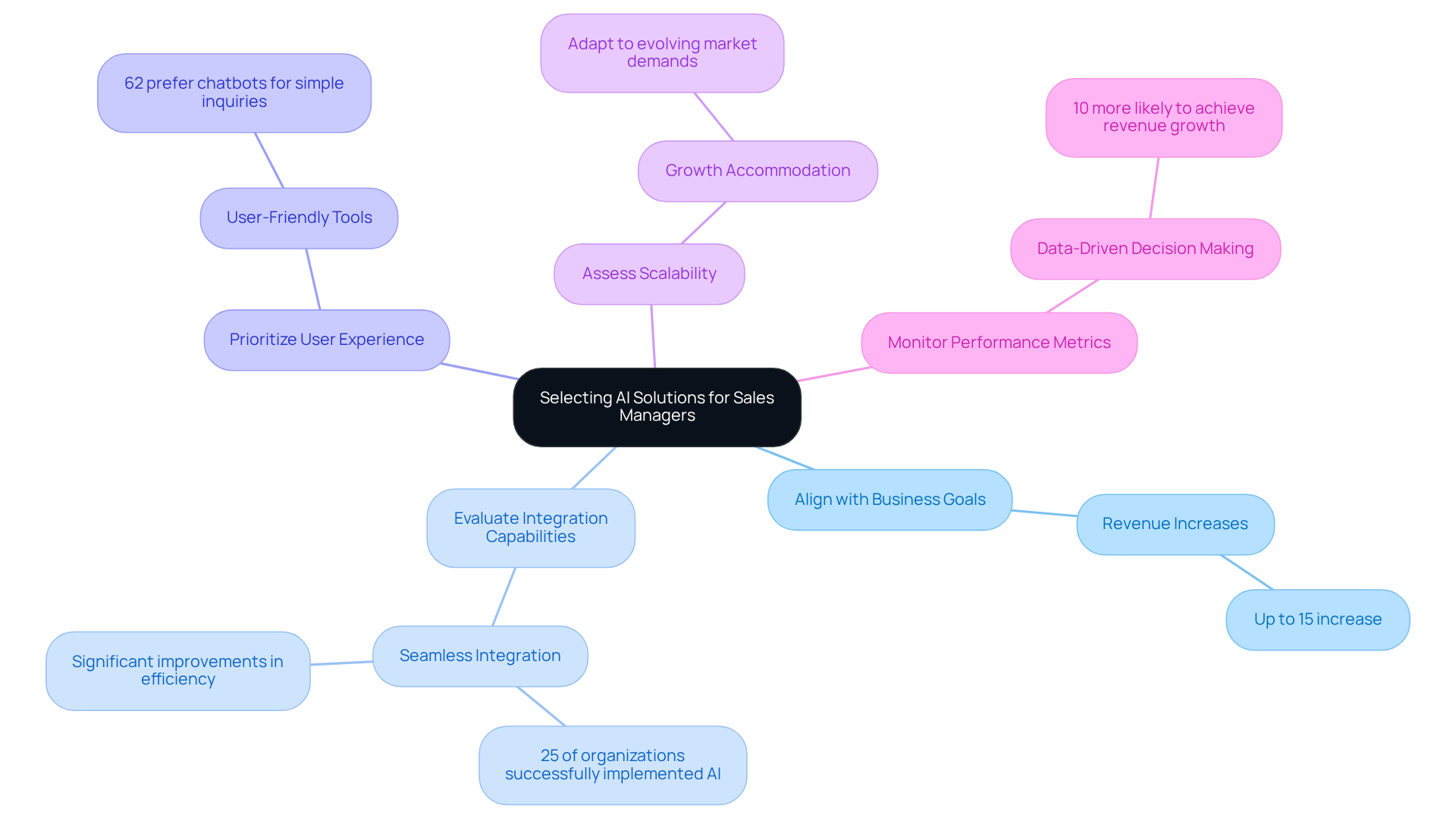Introduction
The landscape of customer service is undergoing a radical transformation, driven by the rapid advancement of artificial intelligence technologies. Tools like chatbots and virtual assistants are becoming mainstream, presenting businesses with an unprecedented opportunity to enhance customer interactions and streamline operations.
However, as sales managers navigate this evolving terrain, they face a significant challenge: selecting the right AI solutions from a myriad of options. Which tools truly deliver on their promises? How can they be effectively integrated into existing workflows to maximize customer satisfaction and operational efficiency?
This is not just a matter of choice; it’s about leveraging the right technology to stay competitive in a fast-paced market. As we delve deeper into this topic, we will explore the essential criteria for evaluating AI tools and the strategies for successful implementation, ensuring that your business not only adapts but thrives in this new era of customer service.
Understanding AI Tools in Customer Service
The use of an AI tool for customer service marks a pivotal advancement in automating and enhancing interactions. These technologies - chatbots, virtual assistants, and AI-driven analytics platforms - leverage natural language processing (NLP) and machine learning to understand inquiries, provide immediate responses, and extract valuable insights from client data.
Consider Intone's AI voice agents, which exemplify this evolution, especially in e-commerce settings. They empower businesses to upsell products and re-engage past buyers seamlessly. These agents can instantly address FAQs, track orders, and reset passwords, significantly boosting efficiency, reducing response times, and enhancing satisfaction through personalized experiences.
For instance, Intone's AI agents adeptly handle routine inquiries, allowing human agents to focus on more complex issues. This optimization of the overall support workflow is crucial. Furthermore, the seamless integration of Intone's AI voice agents ensures that organizations can swiftly enhance their client support capabilities. This not only streamlines the client interaction process but also guarantees that patrons receive timely assistance and effective order management, thereby improving operational efficiency.
In summary, the implementation of an AI tool for customer service is not just a trend; it represents a strategic move towards more efficient and satisfying customer interactions. By embracing these technologies, businesses can elevate their service standards and foster stronger relationships with their clients.

Comparison Criteria for AI Customer Service Solutions
When evaluating AI customer service solutions, several critical criteria must be considered:
-
Functionality: Assess the range of tasks the AI can perform, including lead qualification, customer support, and payment reminders. A versatile AI can significantly enhance operational efficiency, making it a vital asset for any business.
-
Integration: The capability of the AI application to seamlessly connect with existing systems and workflows is crucial. Over 36% of businesses face challenges in integrating AI tools, which can hinder their effectiveness. Successful integration ensures that AI enhances rather than disrupts current processes, paving the way for smoother operations.
-
User Experience: The simplicity of use for both clients and agents is paramount. An intuitive interface can lead to greater satisfaction levels, as 90% of clients now anticipate immediate replies when seeking assistance. This expectation underscores the importance of a user-friendly design.
-
Scalability: Evaluate whether the resource can expand alongside the enterprise and handle increasing volumes of client interactions. As client expectations rise, scalability becomes essential for maintaining quality service.
-
Analytics and Reporting: The depth of insights offered by the resource is essential for guiding strategy and enhancing delivery. Tools that provide robust analytics can assist businesses in identifying trends and refining their engagement strategies, ultimately driving better results.
-
Cost: Consider the overall investment required, including subscription fees and potential hidden costs associated with implementation and maintenance. Businesses that invest in AI typically see a return of $3.50 for every dollar spent, with top performers achieving returns of up to $8. This financial incentive highlights the value of thoughtful investment in AI solutions.
By concentrating on these criteria, sales managers can make informed choices when evaluating an AI tool for customer service. This ensures they select solutions that not only meet current requirements but also adapt to future demands.

Comparative Analysis of Leading AI Customer Service Tools
In this comparative analysis, we delve into three leading AI customer service tools that can transform your customer support experience:
-
Zendesk AI: This tool is renowned for its powerful ticketing system and seamless integration with CRM platforms. Zendesk AI excels in delivering comprehensive client support, making it a top choice for businesses aiming to enhance their service quality. Its robust analytics capabilities empower companies to track performance metrics effectively, ensuring informed decision-making. However, potential users should be aware that it may require a steeper learning curve for newcomers.
-
Intercom: Known for its user-friendly interface, Intercom stands out in facilitating real-time interactions with clients through chat and messaging. Its automation features significantly reduce response times, enhancing customer satisfaction. Nevertheless, businesses should consider that its pricing can be higher compared to competitors, which may impact budget decisions.
-
Freshdesk: Offering a cost-effective solution, Freshdesk comes equipped with essential automation features and a straightforward setup process. While it may lack some advanced analytical capabilities, it serves as an excellent option for small to medium-sized enterprises seeking an economical introduction to AI support.
Each of these tools, particularly the AI tool for customer service, possesses unique strengths, making the choice dependent on specific business requirements and budget limitations. By understanding these options, businesses can make informed decisions that align with their customer service goals.

Key Takeaways for Sales Managers in Selecting AI Solutions
Sales managers must consider several key takeaways when selecting AI customer service solutions:
-
Align with Business Goals: It's essential that the chosen AI tool aligns with your overall sales strategy and customer engagement objectives. This alignment is not just a best practice; organizations that effectively integrate AI into their sales processes report revenue increases of up to 15%.
-
Evaluate Integration Capabilities: Seek solutions that can seamlessly integrate with your existing systems to prevent operational disruptions. Successful integration is vital; in fact, 25% of organizations have successfully implemented AI automation, leading to significant improvements in efficiency.
-
Prioritize User Experience: Choose tools that enhance the client experience and are user-friendly for agents. A positive user experience can drive adoption rates, with 62% of users preferring chatbots for simple inquiries. This statistic underscores the importance of intuitive design.
-
Assess Scalability: Opt for a solution that can grow alongside your business, accommodating future needs without necessitating a complete overhaul. Scalable solutions are crucial for adapting to evolving market demands and client expectations.
Monitor performance metrics by leveraging the analytics features of the AI tool for customer service to continuously evaluate its impact on customer service and sales performance. Organizations that monitor pipeline metrics are 10% more likely to achieve year-over-year revenue growth, highlighting the importance of data-driven decision-making.

Conclusion
The integration of AI tools in customer service is revolutionizing client interactions, presenting businesses with a vital opportunity to boost efficiency and satisfaction. By harnessing advanced technologies like chatbots and virtual assistants, organizations can automate routine inquiries, allowing human resources to concentrate on more complex tasks. This shift ultimately cultivates stronger relationships with clients.
Key insights explored in this article underscore the significance of:
- Functionality
- Integration
- User experience
- Scalability
- Analytics
- Cost
when assessing AI customer service solutions. Each highlighted tool - Zendesk AI, Intercom, and Freshdesk - offers distinct strengths, catering to various business needs and budgets. Grasping these differences empowers sales managers to make informed decisions that align with their customer service objectives.
In a rapidly evolving marketplace, adopting AI tools is not merely advantageous; it is essential for sustaining a competitive edge. Sales managers must prioritize the thoughtful selection and integration of these technologies to drive operational efficiency and elevate customer satisfaction. By doing so, organizations can not only address current demands but also strategically position themselves for future growth and success in the customer service arena.
Frequently Asked Questions
What are AI tools in customer service?
AI tools in customer service include technologies such as chatbots, virtual assistants, and AI-driven analytics platforms that use natural language processing (NLP) and machine learning to enhance customer interactions.
How do AI tools improve customer service interactions?
AI tools improve customer service by understanding inquiries, providing immediate responses, and extracting valuable insights from client data, which enhances efficiency and customer satisfaction.
What is an example of an AI tool used in customer service?
An example of an AI tool is Intone's AI voice agents, which are particularly effective in e-commerce settings for upselling products and re-engaging past buyers.
What tasks can Intone's AI voice agents perform?
Intone's AI voice agents can address FAQs, track orders, and reset passwords, which boosts efficiency and reduces response times.
How do AI tools benefit human customer service agents?
AI tools allow human agents to focus on more complex issues by handling routine inquiries, optimizing the overall support workflow.
What is the impact of integrating AI voice agents on client support capabilities?
The integration of AI voice agents streamlines the client interaction process, ensuring timely assistance and effective order management, which improves operational efficiency.
Why is the implementation of AI tools considered a strategic move for businesses?
Implementing AI tools is considered a strategic move because it leads to more efficient and satisfying customer interactions, helping businesses elevate their service standards and build stronger client relationships.






